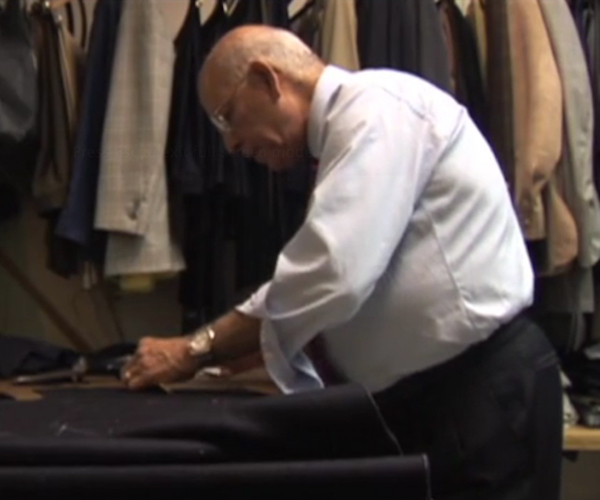Film Review: “Men of the Cloth”—Portrait of an Artist as an Old Man
Director Vicki Vasilopoulos has masterfully crafted a documentary about tailors, clothing, and the painstaking search for excellence.
Men of the Cloth, directed by Vicki Vasilopoulos. Screening at the Museum of Fine Arts Boston on December 10.

A scene from “Men of the Cloth.”
By Paul Dervis
To be honest, when I was assigned to review this documentary I was not looking forward to it. A film helmed by a rookie director about the trials and tribulations of aged tailors: it didn’t sound like something that would be particularly engaging.
Well, I was wrong.
Director Vicki Vasilopoulos has masterfully crafted this film, not unlike how her subjects have masterfully crafted their garments. And make no mistake about it, these tailors are artists with pins in their collective mouths.
Opening with images that capture the ancient beauty of a small town in Italy, the film immediately suggests that that kind of splendor will be created (and embodied) by her heroes. The film’s protagonists are three elderly Italian tailors: one hones his craft in Manhattan; another plies his trade in a Philadelphian suburb; the last is building an empire in his homeland. They are scattered across the globe, but the sublimity of their skills connect them.
Nino Corvato dropped out of school after the sixth grade to apprentice in the clothing industry. As a young man, his work took him to America and (of course) to Brooks Brothers. But employment by a menswear giant proved frustrating. When, even though his talent had been acknowledged, he was passed over for promotion because of his lack of formal education, he set out to make it on his own. Now, some 40 years later, he has a business in the priciest location in New York City, making handmade suits for the upper crust. He has even been teaching his trade at Parsons Fashion School in Greenwich Village. Approaching the twilight of his career, he now wants to establish his own program for aspiring young craftspeople.
It is an attempt to maintain a dying art.
Joe Centofanti, the Philadelphia tailor, has had a remarkably intriguing life. Still working when this film was shot (he was 90 years old), he had made uniforms for Italian fascists and spent years during the war in an internment camp in Africa, where he continued to cut cloth. Now, as he envisions the end nearing, he has taken in an apprentice of his own, in hopes of continuing an invaluable legacy. That young man, Joe Genuardi, a Carnegie Mellon graduate, dreams that one day he will be able to combine the intricacies of handmade work with the contemporary production of the ‘factory’ industry.
That idea leads the filmmaker to Checchino Fonticoli, the Italian master who stayed home…or did he? As a young man he was one of a hundred tailors in his town—now he stands alone. Yet he has slowly grown his business into a major business operation, with countless workers creating his men’s fashions. And, though he is still in his native land, he travels the world, creating clothing for kings and presidents. Along the way, he has won Italy’s most prestigious honor for tradesmen.
Vasilopoulos clearly has an enormous love for these men and what they represent. And well she would. A former fashion editor herself, she has spent nearly a dozen years making Men of the Cloth, admiring her subjects and their miraculous skills.
The appeal of this film is its ability to take a subject that could be potentially boring, making clothes, and turning it into a deeply moving narrative, a story that is filled with a deep lust for life. At no time does Men of the Cloth drag. Even when the action becomes somewhat repetitive, Vasilopoulos finds something unique and compelling for us to see.
Equally clear is these old men are not merely superb craftsmen, but artists who obsessively pay attention to every detail; it is their striving for perfection that transforms them into archetypes. Their painstaking search for excellence separates their world of fashion from that of our ‘off the rack’ realities.
Enjoy the inspiring lives of these men…they will not be coming around again.
Paul Dervis has been teaching drama in Canada at Algonquin College as well as the theatre conservatory Ottawa School of Speech & Drama for the past 15 years. Previously he ran theatre companies in Boston, New York, and Montreal. He has directed over 150 stage productions, receiving two dozen awards for his work. Paul has also directed six films, the most recent being 2011’s The Righteous Tithe.
Tagged: documentary, Men of the Cloth, Museum of Fine Arts, Paul Dervis
